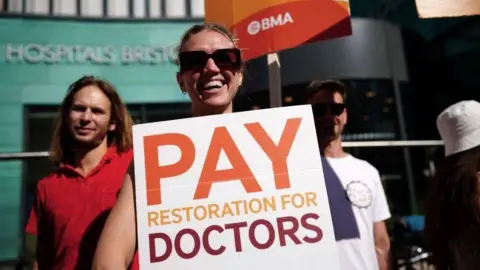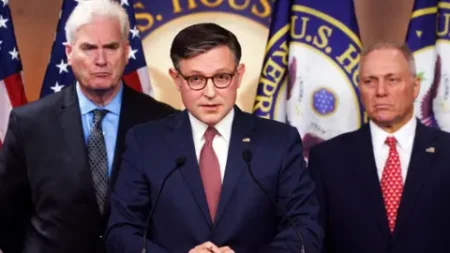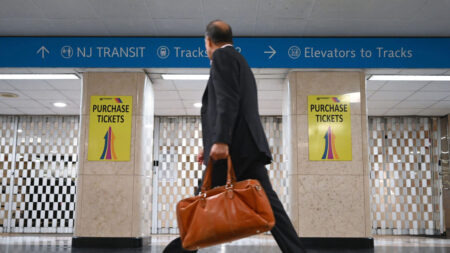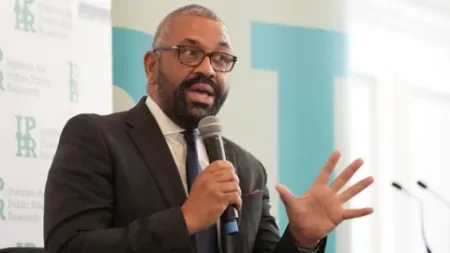The British Medical Association (BMA) has declared that a five-day strike by doctors in England will proceed as planned, following unsuccessful negotiations with the government. This strike is set to begin on a Friday and has raised considerable concern regarding patient care and healthcare services during that period. The union’s decision was announced despite five days of discussions between government representatives and BMA members, which many had hoped would lead to a resolution concerning working conditions and pay for resident doctors, a term used for junior doctors in the UK.
In a letter sent earlier on Tuesday, Health Secretary Wes Streeting attempted to urge the BMA to postpone the strike, promising to continue negotiations should they delay their planned action. However, the BMA responded by stating that the proposals offered by the government were insufficient, with particular emphasis on the need for improved pay. In a rebuttal, Streeting expressed disappointment and criticized the BMA’s choice to escalate the situation to strike action, suggesting that their decision was irresponsible and unjustified given the ongoing discussions.
The co-chairs of the BMA’s resident doctors committee, Dr. Melissa Ryan and Dr. Ross Nieuwoudt, emphasized their efforts to reach a compromise throughout the talks. They expressed a willingness to collaborate in good faith, revealing that a credible and respectful path toward pay restoration presented by the government could have avoided the need for strikes. During their negotiations, the BMA stressed that they were also interested in discussing various non-pay issues that have a significant financial impact on doctors, but they maintained that the core issue remained the disparity in pay.
In the backdrop of this dispute is the government’s inability to shift their stance on pay, which has led to increased discontent among doctors. Throughout the last week, discussions have also touched upon non-remuneration aspects such as funding for mandatory medical exam fees, improved control over placement during the initial years of training, and enhanced career progression opportunities, ideally addressing the lengthy training periods that can last more than a decade for resident doctors. Furthermore, discussions around potential student loan forgiveness programs were mentioned, especially since many doctors graduate with substantial debts.
Despite the BMA indicating that resident doctors received a notable average pay rise of 5.4% for the fiscal year, they assert that current wages are approximately 20% lower in real terms compared to 2008 figures, thus advocating for what they term “pay restoration.” The Health Secretary responded, asserting that the BMA was offered various options that could positively impact working conditions, stating that their refusal to postpone the strike would lead to unnecessary disruptions.
In the context of patient safety, the BMA previously suggested that the operational plans laid out by NHS England in the face of this strike may jeopardize patient care. The union has raised alarms that the strategy to limit cancelled routine treatments could overload senior doctors who are set to cover for striking resident doctors. NHS England has mandated hospitals to only cancel non-urgent procedures under exceptional circumstances, which increases the risk of service disruption.
Deputy leader of the BMA, Dr. Emma Runswick, voiced vigorous concern over these contingency plans, warning that they could lead to severe issues and even harm for patients, as senior doctors are not able to manage simultaneous responsibilities in several locations. She further made the case that a significant number of planned treatments should be rescheduled, highlighting the logistical challenges posed by the strike.
Previous strikes in 2023 and 2024 had resulted in vast cancellations of non-urgent work, providing a safety net of emergency and urgent services. This time, however, NHS England, under the new leadership of Chief Executive Sir Jim Mackey, is taking a different approach in an attempt to minimize disruption while recognizing that postponing planned care is equally challenging and can also threaten patient safety.
The situation remains fluid and continues to attract attention amidst concerns about healthcare coverage and patient welfare during the impending strike. This ongoing conflict underscores the broader struggles facing healthcare professionals in the UK, particularly regarding pay structures and working conditions.











